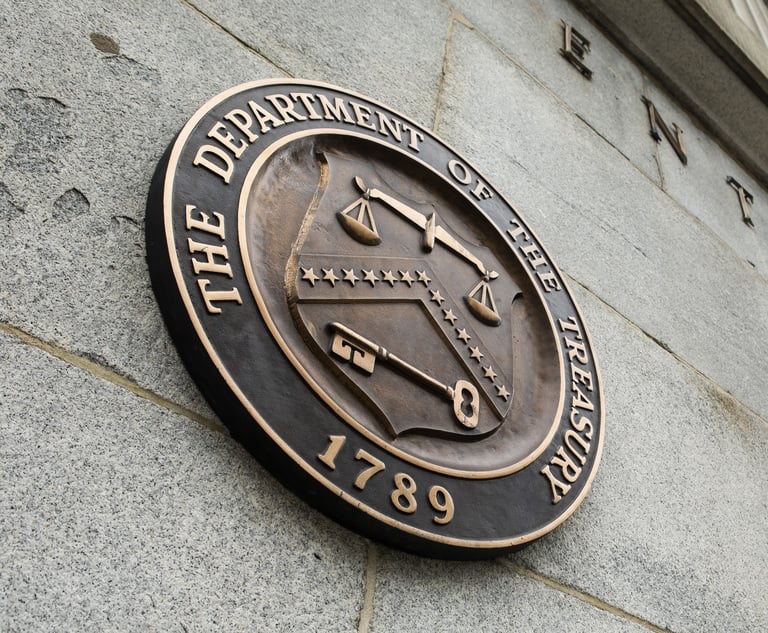IRS Virtual Currency Amnesty? Not So Fast!
Many taxpayers jumped into virtual currency investing during 2017. They might now be asking themselves: Will the IRS know if I made money with Bitcoin (or other virtual currencies)? Do I have to report my gains or losses? Are virtual currency transactions reportable? Yes, Yes and Yes.
March 21, 2018 at 10:07 AM
5 minute read

Many taxpayers jumped into virtual currency investing during 2017. They might now be asking themselves: Will the IRS know if I made money with Bitcoin (or other virtual currencies)? Do I have to report my gains or losses? Are virtual currency transactions reportable? Yes, Yes and Yes.
Here are what IRS states regarding virtual currency:
- Bitcoins are not a currency. They are considered personal property and taxed as a capital asset.
- If a Bitcoin is converted into currency and there is a gain, it is subject to capital gain.
- If goods or services are purchased with Bitcoins, the taxpayer must also account for the gains.
- A taxpayer that receives Bitcoin as payment for goods or services must include the fair market value of the digital currency received measured in USD in the gross income on the date of the receipt.
- Digital currency that is held and then sold at a gain is subject to either long- or short-term capital gains tax.
- A taxpayer, who holds digital currency for sale in a trade or business, is subject to ordinary gain or loss upon sale.
- Digital currency is recognized income immediately at the fair market value. This income could be subject to self-employment tax
According to the IRS, the general tax principles that apply to “property” transactions are:
- Wages paid to employees using virtual currency are taxable to the employee, must be reported by an employer on a Form W-2, and are subject to federal income tax withholding and payroll taxes.
- Payments using virtual currency made to independent contractors and other service providers are taxable and self-employment tax rules generally apply. Payers must issue Form 1099.
- The character of gain or loss from the sale or exchange of virtual currency depends on whether the virtual currency is a capital asset in the hands of the taxpayer.
- A payment made using virtual currency is subject to information reporting to the same extent as any other payment made with property.
Many Bitcoin investors do not receive appropriate tax advice relating to their virtual currency transactions. Some investors believe that virtual currency transactions are beyond the control and supervision of the government. There are also investors that are under the impression that they can obtain “good advice” on a chatroom or through a web search. Rather, taxpayers investing, making payments or receiving payment in virtual currency ought to consult a credible tax specialist.
For the “virtual currency investor” that thinks that he or she can go “undetected,” on October 2017, the IRS formally launched a new International Tax Enforcement Group dedicated to working significant international tax cases. The group will consolidate under one umbrella, subject experts that have worked cases of international tax compliance. The U.S. Department of Justice Tax Division will provide support to this group. The use of data analytics is critical to the success of the group; which will benefit from information sourced through:
- The Bank Secrecy Act (BSA)
- Whistleblowers
- The Offshore Voluntary Disclosure Program
- The Panama Papers
- FATCA
- IRS “John Doe” summons against Coinbase (a U.S.-based Bitcoin exchange) requiring Coinbase to turn over the tax identifying information of 14,000 accounts
Why Is This Important?
The IRS and the DOJ have accumulated substantial data analytics which they plan to use to increase their focus on virtual currencies. Both the IRS and the DOJ have stated that virtual currency can be a method to evade taxes. From 2013 to 2015, the IRS reported that only approximately 800 to 900 taxpayers reported Bitcoin transactions. This insignificant number of reported Bitcoin transactions indicates significant noncompliance to the government agencies. As a result, the IRS and DOJ will “follow the money” and utilize all of the resources available, particularly in the new International Tax Enforcement Group. Currently there are attachés on the ground in Barbados, Bogota, Frankfurt, The Hague (Europol headquarters), Hong Kong, London, Mexico City, Ottawa, Panama City and Sydney.
Amnesty for Virtual Currency? Not Yet. Best to Come Forward First.
International tax enforcement is a key priority for the United States. The United States has collected a vault of valuable information over the years. Via data analytics, the IRS is going to leverage resources, knowledge and expertise. IRS tax attachés in foreign countries working in tandem with foreign government officials will also assist the IRS.
U.S. taxpayers that have unreported virtual currency transactions as well as unreported assets are advised to come forward first. Out of compliance Taxpayers are ineligible for IRS tax amnesty programs (offshore voluntary disclosure program—OVDP or the streamlined filing compliance procedures—streamlined) if they are identified first.If a taxpayer's name is identified by FATCA reporting, an “IRS summons” or any other third-party information, the taxpayer will not be able to participate in an OVDP or streamlined program.
Don't be a victim of your own making. The OVDP and streamlined procedures could be potential options for out of compliance virtual currency taxpayers. Domestic voluntary disclosures could also assist where domestic virtual currency transactions are out of compliance. Consult your tax specialist now.
Stanley Foodman is president and CEO of Foodman CPAs & Advisors in Miami.
This content has been archived. It is available through our partners, LexisNexis® and Bloomberg Law.
To view this content, please continue to their sites.
Not a Lexis Subscriber?
Subscribe Now
Not a Bloomberg Law Subscriber?
Subscribe Now
NOT FOR REPRINT
© 2025 ALM Global, LLC, All Rights Reserved. Request academic re-use from www.copyright.com. All other uses, submit a request to [email protected]. For more information visit Asset & Logo Licensing.
You Might Like
View All

Don’t Forget the Owner’s Manual: A Guide to Proving Liability Through Manufacturers’ Warnings and Instructions
5 minute read

Trending Stories
- 1Crocs Accused of Padding Revenue With Channel-Stuffing HEYDUDE Shoes
- 2E-discovery Practitioners Are Racing to Adapt to Social Media’s Evolving Landscape
- 3The Law Firm Disrupted: For Office Policies, Big Law Has Its Ear to the Market, Not to Trump
- 4FTC Finalizes Child Online Privacy Rule Updates, But Ferguson Eyes Further Changes
- 5Chief Judge Joins Panel Exploring Causes for Public's Eroding Faith in NY Legal System
Who Got The Work
J. Brugh Lower of Gibbons has entered an appearance for industrial equipment supplier Devco Corporation in a pending trademark infringement lawsuit. The suit, accusing the defendant of selling knock-off Graco products, was filed Dec. 18 in New Jersey District Court by Rivkin Radler on behalf of Graco Inc. and Graco Minnesota. The case, assigned to U.S. District Judge Zahid N. Quraishi, is 3:24-cv-11294, Graco Inc. et al v. Devco Corporation.
Who Got The Work
Rebecca Maller-Stein and Kent A. Yalowitz of Arnold & Porter Kaye Scholer have entered their appearances for Hanaco Venture Capital and its executives, Lior Prosor and David Frankel, in a pending securities lawsuit. The action, filed on Dec. 24 in New York Southern District Court by Zell, Aron & Co. on behalf of Goldeneye Advisors, accuses the defendants of negligently and fraudulently managing the plaintiff's $1 million investment. The case, assigned to U.S. District Judge Vernon S. Broderick, is 1:24-cv-09918, Goldeneye Advisors, LLC v. Hanaco Venture Capital, Ltd. et al.
Who Got The Work
Attorneys from A&O Shearman has stepped in as defense counsel for Toronto-Dominion Bank and other defendants in a pending securities class action. The suit, filed Dec. 11 in New York Southern District Court by Bleichmar Fonti & Auld, accuses the defendants of concealing the bank's 'pervasive' deficiencies in regards to its compliance with the Bank Secrecy Act and the quality of its anti-money laundering controls. The case, assigned to U.S. District Judge Arun Subramanian, is 1:24-cv-09445, Gonzalez v. The Toronto-Dominion Bank et al.
Who Got The Work
Crown Castle International, a Pennsylvania company providing shared communications infrastructure, has turned to Luke D. Wolf of Gordon Rees Scully Mansukhani to fend off a pending breach-of-contract lawsuit. The court action, filed Nov. 25 in Michigan Eastern District Court by Hooper Hathaway PC on behalf of The Town Residences LLC, accuses Crown Castle of failing to transfer approximately $30,000 in utility payments from T-Mobile in breach of a roof-top lease and assignment agreement. The case, assigned to U.S. District Judge Susan K. Declercq, is 2:24-cv-13131, The Town Residences LLC v. T-Mobile US, Inc. et al.
Who Got The Work
Wilfred P. Coronato and Daniel M. Schwartz of McCarter & English have stepped in as defense counsel to Electrolux Home Products Inc. in a pending product liability lawsuit. The court action, filed Nov. 26 in New York Eastern District Court by Poulos Lopiccolo PC and Nagel Rice LLP on behalf of David Stern, alleges that the defendant's refrigerators’ drawers and shelving repeatedly break and fall apart within months after purchase. The case, assigned to U.S. District Judge Joan M. Azrack, is 2:24-cv-08204, Stern v. Electrolux Home Products, Inc.
Featured Firms
Law Offices of Gary Martin Hays & Associates, P.C.
(470) 294-1674
Law Offices of Mark E. Salomone
(857) 444-6468
Smith & Hassler
(713) 739-1250






